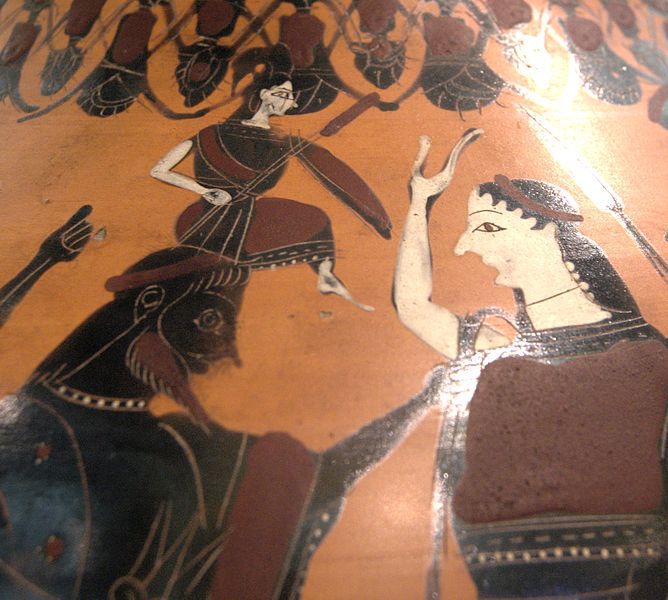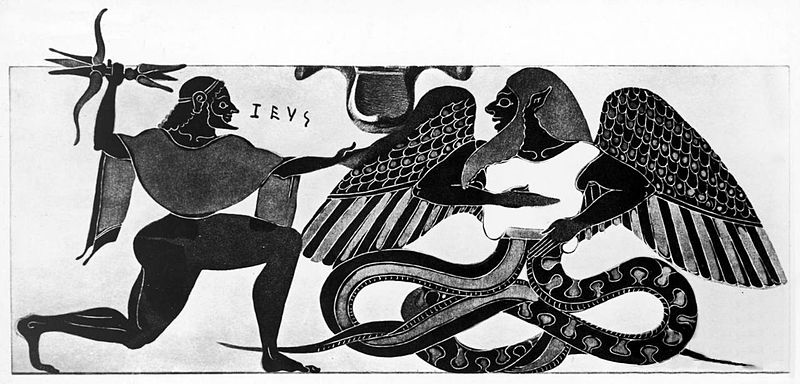Well, I think there may be some confusion over representations of Zeus across the ages... but that gives me an excuse to make a post with a lot of neat ancient art in it, so no complaints from me!
To start with, I'm not sure who told you that the ancient Greeks didn't like beards, but they were tragically wrong. The Greeks loved a nice beard, which they saw as a sign of virility and manliness, and having no beard was considered the mark of a young boy or a less-than-manly dude. They were so all about their beards that criminals in Sparta were sometimes forcibly shaved, thus publicly humiliating them. Of course, the ideal Greek beard was carefully trimmed and maintained, not a wild, bushy forest of follicles, but it certainly wasn't the mark of a barbarian. (However, fun fact: ancient Egyptians did make a point of shaving their beards, initially because it cut down on lice infestations and later because it had become a fashionable sign of nobility.)
So when you go out a-seeking ancient Greek images of Zeus, you'll almost always get beards, beards all across the landscape, in fact! Check it out:

Zeus with Athena popping out of his head. Like a daisy!

Zeus fighting Typhon, beard a-wagging!

Zeus and Hera having sexy hangouts!
However, the Romans, as they do, changed things up somewhat; early Rome didn't do much shaving, but by the second century B.C.E. clean-shaven faces had caught on as a serious fashion, denoting the discipline of the empire and visually reminding all and sundry that they weren't lazy hedonists who couldn't be bothered to pick up a razor or these other barbarian tribes with their face-forests (ironically, it was often specifically intended to broadcast to others that the Roman with such nicely shorn cheeks was not Greek). However, because the majority of religious art of Jupiter was based directly on previous Greek art, the god remained bearded despite the general disfavor of beards among the populace.

Jupiter rocking it out with the royal eagle!

Jupiter laying down some household law!

Jupiter on the back of a coin, looking suave!
Now, technically, there is no "image" of the big-G God of Judaism or Christianity or Islam; he's formless and made of unbelievable splendor and so forth, is never physically described in any of the religions surrounding him, and it was actually quite expressly forbidden to try to make images of God in the ancient and even medieval stages of the religions. However, humans are gonna be humans, which means they like making art of things they feel strongly about, so pictures of God inevitably came into the general cultural consciousness. It's no surprise that the image of God that eventually formed became one of an older, imposing male with flowing beard, similar to previous depictions of gods in the Middle East, because it came out of generally the same area. Images of God were scattered and generally ununified, happening on and off from around the tenth century when the Church officially lifted the ban on divine art, but as usual it's the Renaissance that really shaped the modern conception of what God "looks like"... and the Renaissance was, of course, born in Italy and heavily influenced by the Greco-Roman myths of its bygone ages. Painters were throwing god up on a sacristy and then turning around and splashing Jupiter across a colonnade, and it's inevitable that both took on a certain similar style.
However, it's not really accurate to say that Zeus' image was used for that of the Christian God; honestly, it really wasn't. As you can see from all the pictures up above there, the only things that images of Zeus and images of God really have in common is the beard and a certain air of importance, and even those usually aren't shown the same way. Zeus is usually naked or scantily clad, showing off his badass physique (because the ancient Greeks and Romans loved them some physique!); God is seldom shown in a full-body image, and when he is is almost invariably in long, concealing robes. Zeus has the typical Greco-Roman beard going on, closely shaved and curly, and when we have color usually black or brown; God usually has a flowing stick-it-in-your-belt beard, and is almost always grey or greying. Zeus appears in active poses, passing judgment, throwing thunderbolts, schmoozing with his wife and so on; God is usually passive, peering down at the action from heaven, or occasionally waving his hands to make pronouncements or bestow blessings.
There are exceptions to all of these, of course, but the bottom line is that the two deities really weren't actually conceived of all that similarly. Ancient Greek religion, which placed great emphasis on personal skill, majesty and personality, conceived and artistically represented their god as an athletic but imposing young ruler, a living and attractive part of the universe, while Christianity, which instead emphasizes God's omnipotent power and all-encompassing benevolence, needed a symbol with less action and more dignity, turning to the shorthand of venerable old age and benevolent distance from the world to represent the object of their worship.
Basically, God has to be dignified and fatherly, and Zeus has to be badass and sexy. The overlaps, prior to the modern day, are present but few.
However, I'd argue that it's not the image of God that's being infiltrated by Zeus in the modern day, but rather the other way around. Modern pop culture images of Zeus are clearly influenced by Christianity's ideal of the distantly benevolent, aged patriarch, leading to many, many images in which the King of Olympus has turned to white hair and overlong beard or appears far more distant from events that he might otherwise.

Age of Mythology's Zeus, with familiar muscles and beard but distinctly older than most Greek sources would have shown him.
God of War's Zeus, with beard a-flowin' and obviously advanced age.

Age of Zeus' Zeus, looking like he escaped from an old folks' home for people with superpowers.

Clash of the Titans' Zeus, not yet grey but rocking a crazy barbarian beard and restricted to moping around his house on Olympus for the whole movie hoping people will love him again.
Tip of the iceberg - go to any popular site for art and plug in the word "Zeus", and you'll see page after page of long white beards. The modern idea of what a god - specifically a fatherly, in-charge god - looks like has not only solidified the modern conception of the Christian god but now in reverse affects the gods of other cultures as well (Odin also gets a lot of this - the more modern the image, the more likely he is to look like an old and benevolent father figure instead of a crazy-ass war god).
Now that I've spent most of an hour looking at pretty amphora pictures instead of other useful things I should probably be paying attention to, we can finally roll on down to the last question, which is how Zeus might feel about all this mess. It's a question for individual Storytellers - every ST has different ideas about the exact personality of a given god in their games - but we'd probably assume that Zeus is perfectly fine with all of the above, when and if he notices it (which probably isn't a lot, he's a pretty busy guy). Zeus has always been one of the gods most recognized, worshiped and bowed to in the western world, and it probably doesn't even occur to him to be pleased by the continuing endurance of his image - that's just the natural order of things, after all. You don't get pleased that air still exists when you want to breathe; Zeus probably isn't pleased when mortals still love him, because he has a perfectly healthy ego and would never expect them to do otherwise. Of course, he would probably like some of the old respect to get back into play - where his burnt cattle, you guys? - but he'd be much more surprised if people forgot to make pictures of him than if they make pictures that are slightly wrong.
And, being a god who has at least enough Epic Appearance to barbecue Semele, he can probably look like basically whatever "version" of himself he likes, appropriate to his needs, audience and the moment. Most of the time, we assume he remains his youthfully bearded, sexily muscled Greek self, but since it's unlikely that those expecting to see a long grey beard are going to be any less impressed by him, the exact details are mostly superfluous. Zeus is Zeus. Bow down and everyone will get along just fine.


always thought of Odin at least middle aged. The edda's make mention of his advanced age in comparison to the other Aiser as one of the first three gods and being the all father. Yes he's a crazy ass war god, but I thought he was an old supremely wise crazy ass war go even with the apple's of Idun.
ReplyDeleteI agree, actually - most of the Aesir are probably middle-aged. The ancient Norse would have thought of them as men in their prime and didn't have the Greco-Roman (and Hindu, for that matter) obsession with youth, and probably conceived of them as fully adult warriors capable fo supporting some excellent beards and having survived many a war campaign. But they probably also didn't think of them as older; they're gods after all, and eating Idun's apples to boot, so they probably hang out around a ncie 35 for all eternity.
DeleteI could see Odin being a bit older, considering that he's the father of most of the brood, but I'd save the aged graybeard look for when he's in disguise as that thing, not his normal imagery.
Casting Liam Neeson as Zeus means that I can't help but imagine the King of Olympus doing the speech from "Taken" if someone messes with one of his daughters
ReplyDeleteI always figured older Odin was actually normal, at least as the traveler with staff and wide brimmed hat, the imagery (and name) that made Gandalf.
ReplyDeleteWar king Odin obviously seeming more powerful and brutal.
The traveler (Vafudr) is one of Odin's many disguises, so I would assume it's probably not his normal appearance. Norse mythology doesn't really spend any time describing his baseline, though, so I'm sure different STs do it differently.
DeleteMy name is Luciano, i'm Italo-Austrian. I belong to a group of polytheistic believers in Greece (www.ysee.gr). I personally love to see the image of my beloved God, Zeus, as a middle aged God. With a muscled body and a big beard. Zeus and Aphrodite are my two regent Gods. Greetings. Luciano
ReplyDelete